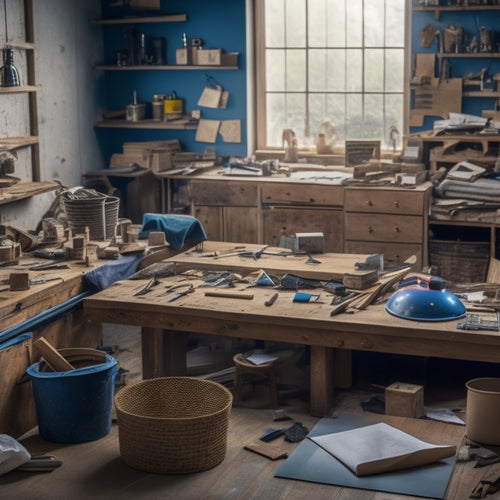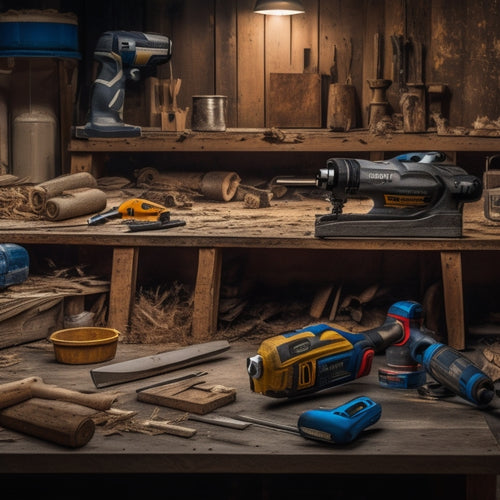
Grouting Tool Safety Precautions for Home Renovations
Share
When tackling a home renovation project, you'll need to take a proactive approach to grouting tool safety. Start by preparing the surface, selecting the right tool, and wearing personal protective equipment like durable gloves and safety goggles. As you grout, work in small sections, use a grout float with a rubber edge, and hold it at a 45-degree angle. Regularly inspect your tools for wear and tear, maintain a clean workspace, and store tools in a designated area to prevent accidents. By following these essential precautions, you'll minimize risks and set yourself up for success - and there's even more to discover about safe grouting practices.
Key Takeaways
• Ensure the grouting surface is clean, dry, and free of debris and old grout to prevent accidents and mistakes.
• Wear personal protective equipment, including durable gloves, safety goggles, and a dust mask, to protect yourself from grout and debris.
• Select the right grouting tool for the task, considering the type of grout, area size, and precision needed, to avoid accidents and mistakes.
• Maintain a clean and organized workspace, keeping cords and hoses organized, to reduce tripping hazards and slipping risks.
• Regularly inspect and maintain grouting tools, storing them in a dry area, to prevent damage, corrosion, and accidents.
Preparing for Grouting Tool Use
Before you plunge into using a grouting tool, take a few minutes to prepare yourself and your workspace to confirm a safe and successful grouting experience.
First, ascertain the grouting surface is properly prepared. Clean the area thoroughly, removing any dirt, debris, or old grout. Check for any cracks or unevenness and make necessary repairs. This will assure a smooth, even application of grout.
Next, select the right tool for the job. Consider the type of grout you're using, the size of the area, and the level of precision required. Tool selection criteria include the type of grout float, grout spreader, or grout scraper you need. Choose a tool that feels comfortable in your hand and is suitable for the task at hand.
Having the right tool will make the grouting process easier and more efficient. By taking the time to prepare your workspace and select the right tool, you'll set yourself up for success and minimize the risk of accidents or mistakes.
Grouting Tool Safety Precautions for Walls
When working with grouting tools on walls, you must take extra precautions to avoid damaging the surrounding surfaces, protecting yourself and the area from grout spills and messes.
Proper wall surface preparation is key to a successful grouting project. Confirm the wall is clean, dry, and free of old adhesive, dirt, or debris. Use a grout float with a rubber edge to prevent scratching the wall surface.
Additionally, use grouting technique tips to minimize mess and maximize efficiency. Apply grout in small sections, working from the top down to prevent drips and runs. Hold the float at a 45-degree angle, pressing it firmly against the wall to fill gaps and joints.
Use a damp sponge or cloth to wipe away excess grout, changing it frequently to avoid re-depositing grout onto the wall.
Personal Protective Equipment Essentials
Regularly, you should wear essential personal protective equipment (PPE) to safeguard yourself from grout-related hazards, including skin and eye irritation, inhalation of dust, and potential injuries from sharp tools or falling debris.
When it comes to gloves selection, choose ones that are durable, waterproof, and provide grip to prevent slippage. Look for gloves with a textured palm and fingers to guarantee a secure hold on grouting tools. Additionally, opt for gloves with a breathable material to prevent moisture buildup and skin irritation.
For eye protection, wear safety goggles or glasses with a scratch-resistant lens. This will shield your eyes from flying debris, grout splatters, and dust particles. Confirm the goggles fit comfortably and provide unobstructed peripheral vision. Consider goggles with anti-fog coatings to prevent misting.
Preventing Grouting Tool Accidents
To prevent grouting tool accidents, you must take specific precautions to minimize the risk of slipping, tripping, and falling while handling grouting tools, especially in confined or slippery workspaces.
One vital step is to guarantee proper grouting tool selection for the job. Choose tools that are designed for the specific task at hand and are in good condition.
Regular grouting tool maintenance is also essential to prevent accidents. Check your tools regularly for signs of wear and tear, and replace or repair them as needed. Make sure the handles are secure, and the blades or edges are clean and sharp.
Additionally, always maintain a clean and organized workspace to reduce tripping hazards. Keep cords and hoses organized, and remove any debris or obstacles that could cause you to slip or trip.
Safe Grouting Tool Storage Practices
You guarantee the safety of yourself and others by storing your grouting tools in a designated area that's easily accessible, dry, and free from hazards. This guarantees that you can quickly find the tools you need while preventing accidents caused by tripping or slipping on scattered tools. Proper storage also helps maintain your tools in good condition, extending their lifespan and saving you money in the long run.
To achieve effective tool organization, follow these guidelines:
-
Designate a specific area: Assign a specific area for your grouting tools, such as a toolbox or a designated shelf, to keep them organized and out of the way.
-
Use protective cases or covers: Store your tools in protective cases or covers to shield them from dust, moisture, and other environmental factors that can cause damage.
-
Label and categorize: Label and categorize your tools according to their function or type, making it easier to find the tool you need when you need it.
Frequently Asked Questions
Can I Use a Grouting Tool on Newly Installed Tiles?
You should wait 24-48 hours after tile installation before using a grouting tool, allowing the adhesive to set; then, employ proper grouting techniques to guarantee a successful and long-lasting result.
How Do I Clean Grouting Tools After Use?
Did you know that 80% of grouting tool damage occurs due to poor cleaning and maintenance? You'll prevent this by washing your tools with mild cleaning solutions and drying them thoroughly, ensuring proper tool maintenance for future use.
Are Grouting Tool Safety Precautions the Same for All Types of Grout?
You'll find that grout types, such as epoxy, acrylic, and cement-based, require distinct safety guidelines, so it's crucial to research and follow specific precautions for each type to guarantee your safety while working with them.
Can I Share Grouting Tools With Friends or Family Members?
You shouldn't share grouting tools with friends or family members without proper cleaning and disinfection, as poor grouting tool hygiene can spread bacteria and contaminate new grout, compromising its integrity and performance.
Do Grouting Tools Expire or Have a Shelf Life?
You should check your grouting tools regularly, as they can deteriorate over time, affecting grout application quality. Proper tool maintenance, such as cleaning and storing, can extend their shelf life, ensuring peak performance.
Conclusion
As you put away your grouting tools, remember that the real test is yet to come - the next project.
Will you be prepared to face the challenges that lie ahead?
Have you learned enough to avoid the dangers that lurk in every grout line?
The fate of your renovation hangs in the balance.
Stay vigilant, stay safe, and always be one step ahead of the grouting game.
Related Posts
-

7 Best Home Renovation Project Checklists With Timelines
You're about to initiate a home renovation project, and establishing a clear plan with timelines is vital to staying ...
-

Top 3 Insurance Options for Home Renovation
When renovating your home, you need specialized insurance coverage to protect your finances from unexpected setbacks ...
-

10 Best Power Tools to Buy for Home Renovation
To tackle your home renovation project efficiently, you'll need the right power tools for the job. A cordless drill f...


